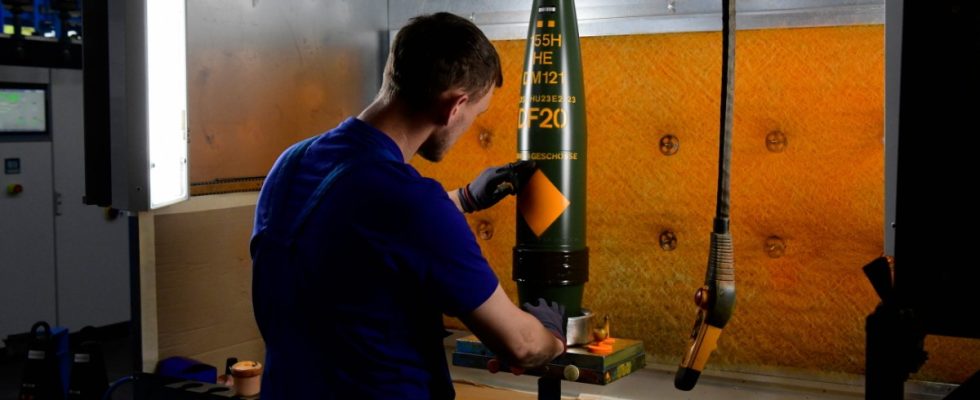Armin Papperger simply wasn’t confident enough. A year ago, the head of Germany’s largest defense company Rheinmetall said he considered a share price of 300 euros to be “realistic.” The paper is now trading at more than 440 euros. The price also rose on Thursday after the 61-year-old manager presented pleasing business figures. The Düsseldorf DAX company with more than 33,000 employees produces tanks, military trucks, anti-aircraft systems, ammunition and laser sights. And the demand for it has grown rapidly since the outbreak of the war in Ukraine. At the same time, the share price has more than quadrupled since then.
“A new decade in security policy has begun,” said Papperger, who has worked at Rheinmetall since 1990. It’s not just the shock of the Ukraine war that is causing governments to spend more money on armaments. European countries also have to fear that a Donald Trump election victory in the USA could weaken NATO and that they can no longer rely as much on protection from the United States. In the Middle East, the war in the Gaza Strip or attacks on ships by Yemen’s Houthi rebels could escalate further. In Asia, there is a threat of a conflict between China and Taiwan. No wonder, then, that governments are preparing for emergencies and modernizing and expanding their armies.
In Germany there is a special fund worth 100 billion euros for the Bundeswehr. Papperger said quite patriotically that Rheinmetall was “grateful to be able to make decisive contributions to restoring our country’s military capability.” Last year the company received orders worth ten billion euros from the Bundeswehr, and this year it will probably be even more.
An industry that has long had a bad image is benefiting from the boom. But since Russia’s attack on Ukraine, Rheinmetall can no longer avoid applications for jobs. At the same time, European manufacturers are comparatively small – in terms of arms sales, the global rankings are led by American companies such as Lockheed Martin, Northrop Grumman and Boeing. Rheinmetall achieved in these statistics from the Stockholm peace research institute Sipri is not even in the top 25.
The boss expects twice as much sales
However, Papperger announced that sales should break the ten billion euro mark for the first time this year. In the past year he rose by an eighth to a good seven billion euros. Operating profit before interest and taxes increased by a fifth to more than 900 million euros – a record. The bottom line was half a billion euros in profit. Shareholders can therefore look forward to a higher dividend; Rheinmetall will pay out 5.70 euros per share.
The value of the orders on the books grew even faster than sales and profits. Here, the Düsseldorf-based company once again achieved a record of 38 billion euros. That’s why Papperger expects business to double further in the long term: “Whether it’s five or seven or eight years – I see the potential for us to have a turnover of 20 billion euros.”
Rheinmetall’s ammunition business is particularly important for Europe’s defense capability at the moment. The group is the largest manufacturer of artillery shells in the Western world. Ukraine urgently needs such ammunition, and other armies also need to fill their warehouses.
Papperger is therefore expanding its production capacity. By the end of 2024 it should be 700,000 shots per year, he said. By 2027 there should be 1.1 million shots, thanks to a new production facility in Rheinmetall’s largest plant in Unterlüß, Lower Saxony, as well as two planned plants in Ukraine and Lithuania. For comparison: Before the Ukraine war, the company sold just 70,000 bullets per year.
Almost all ammunition goes to Ukraine
At that time, no army replenished its warehouses because it was believed “that artillery ammunition could not be used very effectively because there were nuclear weapons,” said the manager. This assumption was outdated by the war in Ukraine. When asked how much ammunition the company supplies to the invaded country, he said vaguely that “several hundred thousand rounds from Rheinmetall went to Ukraine.” The company is currently sending almost all of its ammunition production to the country.
Rheinmetall also wants to build several plants in Ukraine. Sales to the state increased almost twentyfold last year to almost 600 million euros. In the future there should be billions in sales.
The company could also collect many billions if it were awarded the contract by the US government to develop a successor to the Bradley infantry fighting vehicle. Papperger expects a decision at the end of 2026 and is optimistic. If Rheinmetall got involved, it would be good for the share price. And thus for Papperger’s finances, because the CEO has bought shares on a large scale in recent years.

